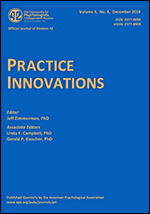Facing a Patient’s Suicide—The Impact on Therapists’ Personal and Professional Identity
by Elsa Ronningstam, Mark Goldblatt, Mark Schechter, Benjamin Herbstman, – members of the Boston Suicide Study Group
Abstract

The loss of a patient to suicide is a challenging experience for therapists that can cause both professional and personal disruptions. This article aims to outline strategies that can help therapists understand, process, and come to terms with the experience of a patient’s suicide and promote acceptance, grief, and continuing personal and professional growth. An objective evaluation of the conditions for the prevention of a suicide will prove to be important, that is, when therapists indeed can versus cannot prevent a patient’s suicide, and recognition of therapists’ actual preventive capacity and limitations. Attention to both personal emotional reactions as well as to relevant facts surrounding the suicide, including autopsy reports, accurate observations, accounts of circumstances, and team assessments, can help guide therapists’ integration of the disruptive event and promote increased understanding and acceptance. Therapists can get help to work through their own feelings and reactions in consultations and individual psychotherapy, peer supervision can promote further comprehension and help the therapist in coming to terms with the event, and team reviews can provide therapists with support and perspectives from within their professional community.
Practice Innovations, 6(2), 89–106, 2021.
Link to Online Publication [fulltext can be requested from the library].
About the Authors
Elsa Ronningstam, PhD is an Associate Professor of Psychology at Harvard Medical School and a Clinical Psychologist at McLean Hospital in Belmont, Massachusetts. She is a psychoanalyst and a member of the faculty at the Boston Psychoanalytic Society and Institute and a member of the Boston Suicide Study Group. She has published and presented extensively nationally and internationally on topics related to studies and treatment of suicide and personality disorders.
Mark J. Goldblatt, MD is a psychiatrist and psychoanalyst in Cambridge, Massachusetts. He is Associate Clinical Professor of Psychiatry at Harvard Medical School, Clinical Associate at McLean Hospital, Faculty Member at the Boston Psychoanalytic Society and Institute, and Founding Member of the Boston Suicide Study Group. His long-standing interest in suicide and psychoanalysis is reflected in his publications and teaching commitments.
Mark Schechter, MD is the Chair of Psychiatry at North Shore Medical Center, and a part-time Instructor in Psychiatry at Harvard Medical School. He is a member of the Boston Psychoanalytic Society and Institute, and a member of the Boston Suicide Study Group. He teaches about suicide in the Massachusetts General Hospital/McLean residency program, and has published papers and book chapters about various aspects of psychotherapy with suicidal patients.
Benjamin Herbstman, MD, MHS is a psychiatrist in private practice in Cambridge, Massachusetts, and a psychoanalyst on the psychotherapy faculty at the Boston Psychoanalytic Society and Institute. He is an Assistant Psychiatrist at McLean Hospital, a part-time Lecturer in Psychiatry at Harvard Medical School, and a member of the Boston Suicide Study Group.
Previous Posts:
Anton O. Kris, MD (2021). Love Is the Great Educator: Response to Richard Frank and Mel Bornstein. Psychoanalytic Inquiry, 41(4-5), 289-291.
Alex Hoffer, MD (2020). Psychoanalysis as a Two-Person Meditation: Free Association, Meditation, and Bion. The American Journal of Psychoanalysis, 80(3): 331–341.
Nancy J. Chodorow, PhD. (2021). Women Mothers Daughters: The Reproduction of Mothering After Forty Years. In Bueskens, P., ed. Nancy Chodorow and The Reproduction of Mothering: Forty Years On. Palgrave, pp. 49-80.
Anthony D. Bram, PhD. (2021). Introduction – In-Session Use of Digital Material in Child Psychoanalysis and Psychotherapy. The Psychoanalytic Study of the Child, 74(1): 304-307.
Steven H. Cooper, PhD. (2021). Toward an Ethic of Play in Psychoanalysis. The Psychoanalytic Quarterly, 90:3, 373-397.
Diane O’Donoghue, PhD. (2021). Amnesias of a Freudian Kind. Part One. American Imago 78(1), 55-77.
Charles Levin, PhD and Dawn Skorczewski, PhD. (2020).The Poetics of Boundary Violation: Anne Sexton and Her Psychiatrist. Psychoanalytic Dialogues, 30(2), 206-221.
Andrea Celenza, PhD (2020). Embodiment and the Perversion of Desire. The Psychoanalytic Quarterly, 89(3), 369-398.
Steven H. Cooper, PhD (2021). Donald Winnicott and Stephen Mitchell’s Developmental Tilt Hypothesis Reconsidered. Psychoanalytic Dialogues, 31(3), 355-370.
Elsa Ronningstam, PhD (2021). Cultural Function and Psychological Transformation of Silence in Psychoanalysis and Psychotherapy. In Dimitrijevic, A. and Buchholz, M.B., eds. (2021). Silence and Silencing in Psychoanalysis: Cultural, Clinical, and Research Perspectives. Routledge, pp. 105-127.
Paola M. Contreras, PsyD (2021). The Magical and the My-Person in Psychoanalysis During the Covid Pandemic. Journal of the American Psychoanalytic Association, 68(6): 1113-1126. Open Access, DOI: 10.1177/0003065120981733
Don R. Lipsitt, MD (2020). In Freud’s Pocket: A Totem of Medical Ambivalence? American Imago, 77(4): 738-751.
Rachel Brier, EdD and Anna Ornstein, MD (2020). Tracking Changes in the Disruption/Repair Sequences: Important Aspects of Clinical Work. Psychoanalysis, Self and Context.
Rodrigo Barahona, PsyaD (2020). Living the Non-Dream: An Examination of the Links Between Dreaming, Enactment, and Transformations in hallucinosis. The Psychoanalytic Quarterly, 89:4, 689-714.
Sarah Ackerman, PhD (2020). A Diagnosis for Psychoanalysis in the 21st Century: Freud as Medicine. The Psychoanalytic Quarterly, 89:4, 667-688.
Lora Tessman, PhD (2020). Review of Ghost in the Human Psyche: The Story of a ‘Muslim Armenian’ , by Vamik D. Volkan. Contemporary Psychoanalysis, 56(2-3):457-464.
Click here to see a full archive of featured papers. All articles can be requested from the library.

